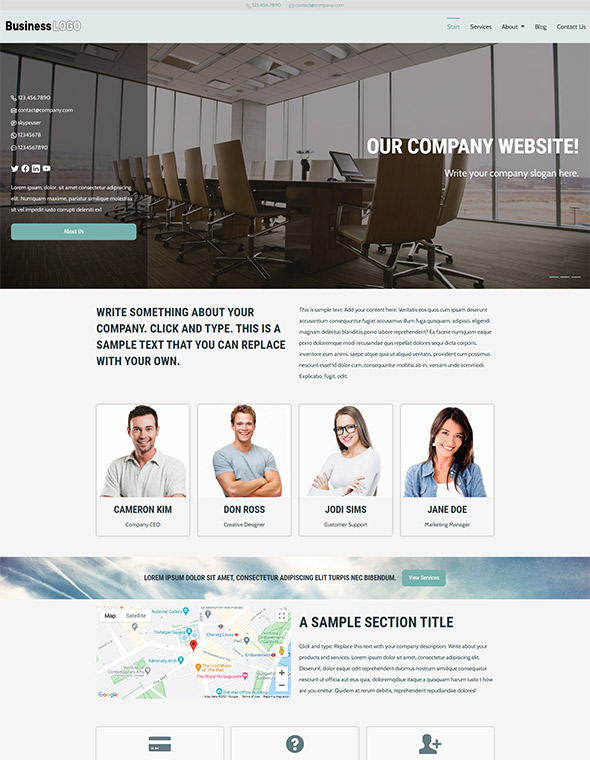Social Media changed the way we communicate with one another. Some would say it changed the course of human interaction, making it more streamlined and readily available. Social media really came about in 1997 with the creation of a site called “Six Degrees”. It enabled users to upload a profile and make friends with other users. A couple of years later in 1999, blogging sites started to gain recognition and popularity. And then in 2006, the introduction of Facebook & Twitter really helped snowball the craze around social media and further its popularity, especially among the younger generation.
Today, there is a wide variety of social networking sites and applications available to use with each one offering its own twist and uniqueness for the user. In this blog post, we are going to give you a simple guide to social media for your business and also how best to use social media networks. We are going to help answer questions such as:
What is social media etiquette and do I use it?
What are the pros and cons of social media?
What are the best social media networks for my business?
So, stay tuned and make sure to stick around till the end of the blog post.
The Introduction Of Social Media
As we briefly mentioned, social media really came about in 1997 with the introduction of a social media site called “Six Degrees”. This site was simple and allowed the user to create, upload their own profile and make friends with other users on the platform. Then came the popularity of the “blog”. This was a way of providing easy to consume information to other users across the internet. In 2002, a challenger emerged called “Friendster”, founded and launched by Peter Jin, Jonathan Abrams and Dave Lee. Unfortunately, they rejected an offer of $30 million to be bought by Google, which is still widely considered as one of the biggest blunders in Silicon Valley history. In 2003, LinkedIn was created/. Yes, it was around for a whole year before Facebook came into existence! In just one year, they grew their user base to over 1 million users.
It wasn’t until Facebook was created in 2004 that social media started to become as popular as it is today. Facebook was initially rolled out to only students of Harvard, however, it soon opened its doors to worldwide users, and within 14 years, amassed over 2.2 billion users!
A year after the creation of Facebook, another now popular social media site was birthed- Youtube. In the years to follow, other social media sites such as Twitter (2006), Instagram (2010), Snapchat (2011) and Vine (2013).
By Feb 6, 2019, it was recorded that 72% of US adults use at least one social media site. Just 10 years prior, that figure was 36%!
Social Media Etiquette
Social media etiquette refers to the guidelines that business and individuals use to preserve the reputation online. Even though social media was introduced in the last 20 years, there have still been a lot of changes to its evolution, meaning typical social rules are finding their ways into digital environments.
Social media etiquette does differ from platform to platform, for example, it is a lot simpler and faster to share someone else's content on Twitter than it is on Instagram.
In order to give you a good starting point when it comes to social media etiquette, we have put together the following points:
- Don’t be overly promotional. Social media is still a place of communication and entertainment so you don’t want to scare away your potential customers and your audience by constantly asking them to buy your products and services. Instead, adopt something such as the 80/20 rule. 80% of your content should be educational and informative, whilst the other 20% can be about your products and services.
- Avoid over automation. It is good to have things planned in advance and social media posts readily scheduled to be posted, but still make sure to keep that human touch when it comes to social media because although social media is part of the digital environment, its users are still living breathing people.
- Don’t bad mouth your competition. This is a crucial etiquette guideline as saying bad things about your competition online can have a very negative impact for your business. This is because your followers and audience will be able to see that you are talking down on your competitors and this is not something that a customer wants to see from a business they are thinking of purchasing from.
- Be authentic and genuine. Always portray your business in its natural light and remember to remain authentic as customers can find any information they wish on a brand so authenticity and genuineness goes a long way.
The Differences Between Popular Social Media Networks
The most widely recognized social media networks (excluding messenger networks) right now are Facebook, Youtube, Instagram & TikTok. Between all 4 of these social media networks, there are differences, especially in regards to their users and the content being posted.
Facebook is deemed by many as the “Godfather” of social media. It is the powerhouse of social communication and activity with over 2.3 billion users. Facebook is the social media network with the most personal functionality. It allows you to not only have your own profile but also to create groups that other users can be part of, list events, sell items within their marketplace, advertise on and much more. Long-form content is best suited to be posted on Facebook as it allows long post captions and “blog-like” structure and editing features.
Youtube
Youtube is based around video content and allows users to upload video content to their channels, amassing views, likes and subscribes to their channel from other users. Youtube has 2 billion users, quickly catching up to the likes of Facebook. But, the two platforms are very much their own entities and provide a different service from each other, with Facebook focusing on social communication and entertainment and YouTube focusing on the widespread of educational, entertaining video content.
Instagram is now owned by Facebook, however, they have made sure to keep Instagram relatively the same since before they acquired it. Instagram is focused on visual content such as photos and videos and is considered as the original “home” of the influencer. Many companies and celebrities use Instagram as a way to reach their customers and audience and it is often the favoured platform over Facebook, due to its higher engagement rates for profiles when compared to Facebook pages. Instagram currently has 1 billion users.
TikTok
TikTok is relatively new to the social media scene since its rebranding from Vine, however, we have included it in this list because of its increasing popularity. As of right now, TikTok has 800 million users and is growing at a huge rate. There were more than 1 billion videos viewed every single day in the year of 2018 and in Q1 of 2019, it was ranked as the most downloaded IOS app with more than 33 million downloads. Now, TikTok adopts a very entertainment-focused style of content, more than so than other social media platforms, and this makes them very competitive within the market because many people use social media as an escape from everyday life and a place to go to be entertained.
Twitter is often deemed as an “information superhighway” for news and politics. It is really a social media platform for sharing information and media coverage, and when it comes to businesses, a lot of businesses use Twitter to update their customers on products or services, provide customer service or simply use it as another medium to publish their content to. As of 2020, there are 330 million users on twitter, which is a lot lower than other social media networks such as Facebook or Youtube.
This is an important platform for businesses. Linkedin has been around since 2002, making it older than Facebook! It is used primarily for professional purposes by both individuals and businesses, with the purpose of growing your network and seeking new business opportunities. Linkedin is a great platform to post interesting content about your business and also connect with others that may be interested in what you can offer. For example, a real estate agency could use Linkedin to reach out to people that may be interested in selling their house or a personal trainer, could reach out to business owners to help them with their fitness and exercise routines. With 575 million users, Linkedin is a great platform for your business to take advantage of.
In addition to the above platforms we have mentioned, there are also other social media platforms that you may wish to consider, depending on your target demographic, ideal customer etc. and where their attention is most.
- Snapchat
- Tumblr
- Twitch
Pros & Cons Of Social Media
Social media does come with its fair share of pros and cons, some of which we have covered below.
Pros
- Social media has further advanced easily accessible worldwide communication, allowing much of the global population access to it.
- It provides an enormous educational opportunity and potential as social media content can stretch to millions (and in some cases billions) of people. Not only can news and media be shared bust also content that teaches about certain topics.
- They help businesses extend their reach and exposure at a very affordable price. If organic reach is what your business is focused on, then there is no cost to using social media, which when executed correctly with a properly laid out plan, can produce great results.
- Social media can help attract more customers, get customer feedback and further build customer loyalty.
- Your business can stay in front of mind. Making sure you are front of mind for your customers helps them remember you, meaning that when they need the product or service that you offer, they know who to call!
Cons
- Social media can be time-consuming as it involves thinking of the content to post, creating it, monitoring and tracking its performance and focusing efforts on growing your online presence and responding to messages.
- Using social media platforms does come with some loss of control since you cannot control the responses you are going to receive from the users of the platforms. This is true for both positive and negative responses.
- There is the potential for brand voice to be diluted over time. If you decide to have a team of individuals working on your social media, then each one may create content with a slightly different tone to the other, unless there is a clear description of what to say and how to say it, which can more often than not, be difficult to implement effectively.
Conclusion
So, when it comes to social media for your business, which platform should you choose?
Well, the answer depends on your customers and where their attention is most. If you are hoping to target a younger demographic, then Instagram is a good platform to be on. If you want to reach an older demographic, Facebook may work best.
It really is down to testing the response you get from each platform and then doubling down on the ones that give you the best exposure and response rates. Every social platform has a wide spectrum of users of all ages, backgrounds and interests, so what may work for one business, may not work for another. As a good rule of thumb, Facebook is great for sharing longer-form content, Instagram is good for sharing visual content, YouTube is perfect for sharing videos and TikTok, well, that is to show the fun side of your business!
We hope this simple guide to social media for your business has helped answer your search query. Remember, social media can be time-consuming and will not come in for fruition overnight. Make sure to stick with it, perform a lot of testing and most importantly, have fun!
Have you read our blog post on 19 Social Media Marketing Strategies To Increase Online Sales?
If you are interested in finding out how VEVS and our team of experts can help your business when it comes to social media, please visit our digital marketing page for more information.











